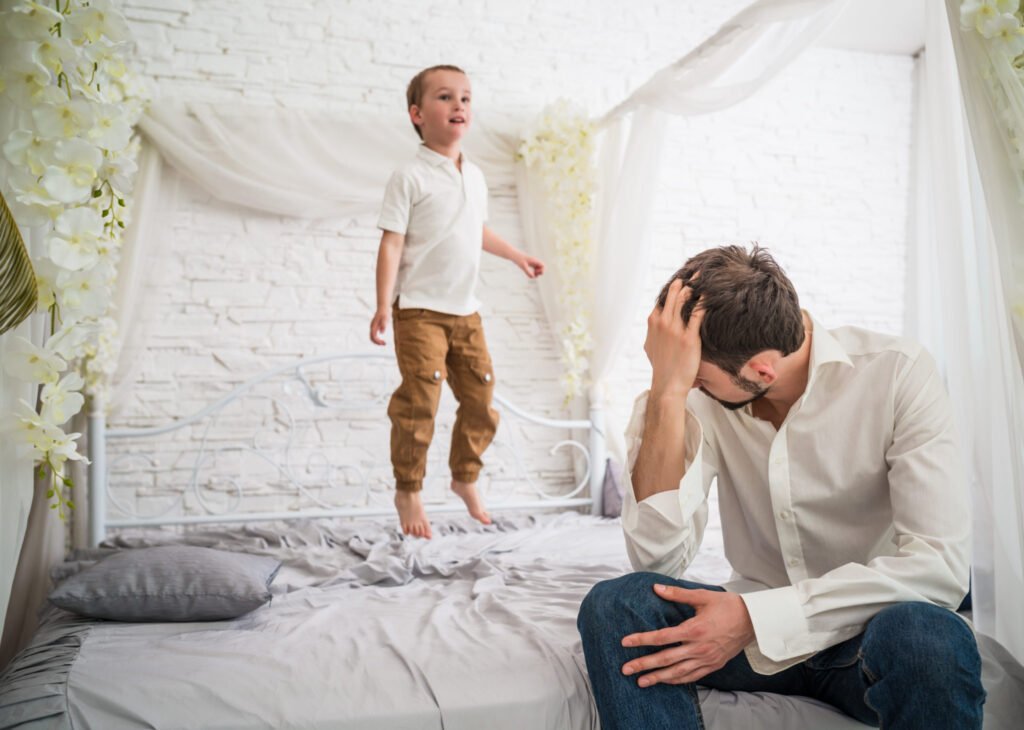The phenomenon of burnout should not be associated with work environment only. It is something which can also be experienced by parents. Parents cannot take a rest from their parenting role, they take care of another human being all the time, are concerned for their well-being and set more and more challenges for themselves. There comes a time when irritability, exhaustion and sense of hopelessness come into their way. Is it ever possible to avoid it?
What is parental burnout?
Parental burnout is a physical, mental and emotional exhaustion felt as a result of permanent stress provoked by parenthood. It is extremely hard to take care of another person and to raise them. Although parenthood can bring a lot of satisfaction, it can become a source of concerns as well.
The phenomenon of parental burnout has been studied for years by researchers (first and foremost by Isabelle Roskam and Moïra Mikolajczak) from the Catholic University of Leuven, Belgium. They explain that although those parents who experience difficult situations (such as their child’s chronic disease) are more prone to parental burnout, it can happen basically to any parent.
Although the issue is still more common among mothers than fathers, because it is mainly a woman who spends her whole days at home taking care of her children, parental burnout can also be experienced by men.
The results of the studies performed by the Catholic University of Leuven demonstrate that Poland presents the highest parental burnout figures in Europe – it has recorded almost 40 points (39.4) out of 138 possible ones. It means that an average Polish mother and father experiences on average once a month each of the twenty-three symptoms of parental burnout.
What makes us more prone to parental burnout?
Parental burnout is induced by emotional issues, stress handling difficulties, loneliness, lack of support, being overloaded with everyday duties. It also happens to those who lose the sense of control over their life, those who feel that their life is reduced to one role only – that of a parent – and those who feel that they have to be all the time the responsible one who must know what to do and how to do it. Parental burnout is also about high expectations – both those which we set for ourselves and those which are imposed onto us by the society we live in. The risk of parental burnout is increased when both parents work out of home, in large families, those with young children or where chronic diseases are present.
The threat of parental burnout has also been enhanced by the Covid-19 pandemic. Financial instability, lack of support, social alienation – these are the factors which favor parental burnout. Although defined previously, they have become more prominent during the pandemic.
Symptoms which should not be neglected
The researchers from the Catholic University of Leuven in Belgium point to four main dimensions of parental burnout:
- Emotional exhaustion,
- Contrast between parenting expectations and the reality,
- Feeling tired with being a parent,
- Emotional detachment from the children.
There are moments when every parent feels tired, frustrated or overstimulated – this is a normal thing. However, when parents do not have time to take a rest and regenerate, their low energy levels and irritation can turn into burnout. It most often starts with the feeling of overwhelming exhaustion. The parents of young children are more prone to physical exhaustion (as they have to wake up at night frequently etc.), while those with teenagers at home – to emotional one resulting mostly from permanent quarrels. Exhaustion can turn into the need to detach emotionally from the child, irritability and anger control issues. Parents feel that parenthood has stopped being satisfactory for them and that they have imagined it in a different way.
Symptoms of parental burnout can be felt on a physical, mental and emotional level. They include among others
- Being permanently tired,
- Sense of helplessness, ineffectiveness,
- Self-doubt,
- Negative thoughts about oneself and their competencies,
- Lack of motivation,
- Feeling lonely,
- Irritability, volatility,
- Alienation, willingness to detach oneself,
- Headaches, neckaches, muscle pain,
- Change in eating/sleeping habits.
Parental burnout consequences
As parents cannot take a break from their role they often feel trapped. They become irritable, aggressive, they start neglecting their children. Although they are against screaming, punishments etc., they cannot find other ways to cope with their everyday challenges. Parents can also experience more serious symptoms of burnout such as suicidal thoughts.
Parent behaviour affects children. Those parents who experience burnout are less patient with their kids and become more impulsive. They get angry faster, shout more often, offend and criticize their children, do not listen to them. As a result, children are unhappy, concerned and become harsh on themselves. Even if parents are not aggressive, their emotional detachment makes their kids feel rejected and unloved.
How to deal with parental burnout?
First of all you have to remember that you are not the only one to be fed up, to want to prepare frozen pizza instead of a two-course dinner, to wish to cry and shout at the same time. It is something many a parent experiences. This is why we should talk about parental burnout and share our feelings with others.
To cope with the issue, you can seek support from other people. It is not only about sharing your duties with your partner, but also about asking others for help. It is also recommendable to be less harsh on yourself, to stop striving for perfection in all areas of life. Stop saying „I should”, do what you want instead of what you (think that you) have to do.
It is extremely important to take care of yourself and of your needs. Even a quarter in a bathtub when nobody bothers you is worth its weight in gold.
Perfectly imperfect
It is easy to say that nobody is perfect, that it is enough to be a good enough parent. Unfortunately we are surrounded with perfect images. In social media, on billboards or even from other parents we can hear „it is a matter of organization”. Well, not necessarily. Think about yourself. Keep in mind that parenthood is not the only role you play. Let it go, you don’t have to put 100% of yourself in everything you do. Take care of yourself and your child will be happy. Cause a smiling, balanced parent is what they treasure the most.
Source:
- Roskam, I., Aguiar, J., Akgun, E. et al. Parental Burnout Around the Globe: a 42-Country Study. Affec Sci 2, 58–79 (2021) https://doi.org/10.1007/s42761-020-00028-4




